|
|
What are Diabetes Problem?
|
Too much sugar in the blood for a long time causes diabetes problems. This high-blood sugar can damage many parts of the body, such as the heart, blood vessels, and kidneys. Diabetes problems can be scary, but there is a lot you can do to prevent them or slow them down. This chapter is about nerve problems that can be caused by diabetes. You will learn the things you can do each day and during each year to stay healthy and prevent diabetes problems. |
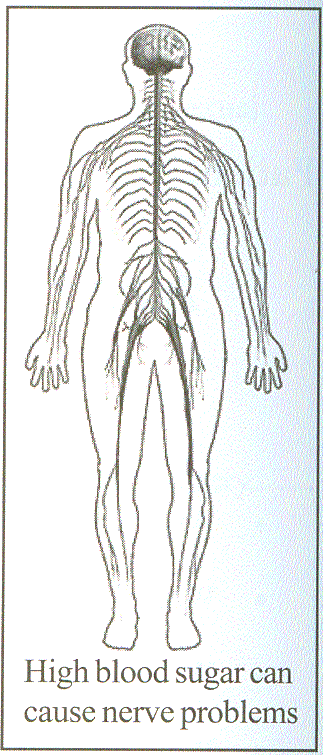 |
What can I Do Each Day to Stay Healthy With Diabetes?
 |
Follow the healthy eating plan that you and your doctor or dietitian have worked out. Eat your meals and snacks at around the same times each day. |
 |
Be active a total of 30 minutes most days. Ask your doctor what activities are best for you. |
 |
Take your diabetes medicine at the same times each day. |
 |
Check your blood sugar every day. Each time you check your blood sugar, write the number in your record book. Call your doctor if your numbers are too high or too low for 2 to 3 days. |
 |
Check your feet every day for cuts, blisters, sores, swelling, redness, or sore toenails. |
 |
Brush and floss your teeth and gums every day. |
 |
Don’t smoke. |
What Can I Do to Prevent Diabetes From Damaging My Nervous System?
The Diabetes Control and Complications Trial, a study sponsored by the National Institutes of Health, showed that people who kept their blood sugar close to normal were able to lower their risk of nerve damage.
Here is what you can do to prevent nerve damage:
|
Keep your blood sugar as close to normal as you can. | |
|
Limit the amount of alcohol you drink. | |
|
Take care of your feet (see What can I do to take care of my feet?). | |
|
Tell your doctor about any problems you have with |
- Your feet and legs.
- Your stomach, bowels, or bladder.
|
Also tell your doctor if you |
- Have problems when you have sex.
- Cannot always tell when your blood sugar is too low.
- Feel dizzy when you go from lying down to sitting or standing.
What Can I Do to Take Care of My Feet?
|
Look at your feet every day to check for problems.
|
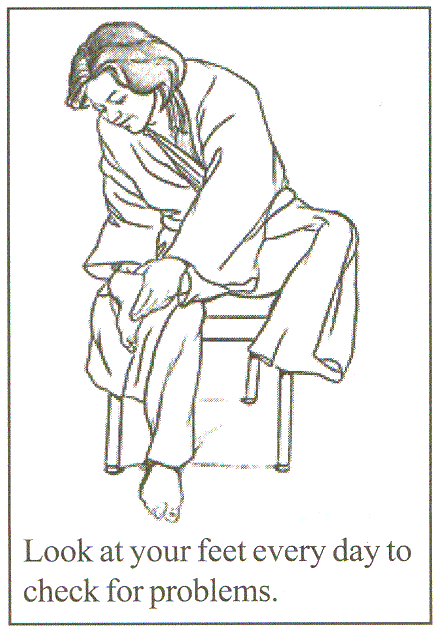 |
||||
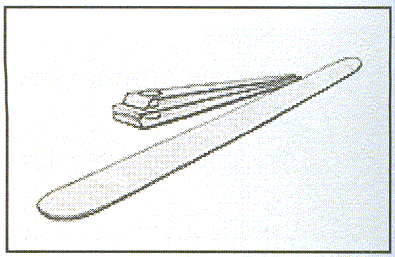 |
|
If your skin is dry, rub lotion on your feet after you wash and dry them. Do not put lotion between your toes. |
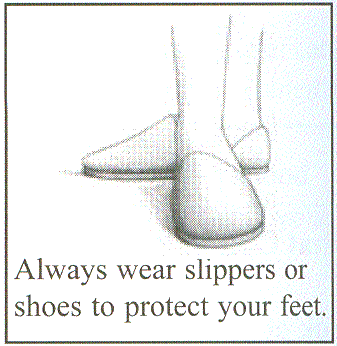 |
|
File corns and calluses gently with an emery board or pumice stone. Do this after your bath or shower. Move the emery board in only one direction. | |
|
Cut your toenails once a week. Cut toenails when they are soft from washing. Cut them to the shape of the toe and not too short. Do not cut into the corners because you might cut the skin. Sharp edges can make a sore that can get infected. File toenails with an emery board. If you cannot cut your own toenails, ask someone who can or go to a foot doctor. | |
|
Always wear socks or stockings. Do not wear socks or knee-high stockings that are too tight below your knee. | |
|
Always wear shoes or slippers. Never walk barefoot, even when you are at home. | |
|
Wear shoes that fit well. Buy shoes made of canvas or leather. Shop for shoes at the end of the day when your feet are bigger. Break in shoes slowly. Wear them 1 to 2 hours each day for the first 1 to 2 weeks. | |
|
Make sure your doctor checks your feet at each checkup. |
What Does My Nervous System Do?
Nerves carry messages back and forth between the brain and other parts of the body. All of your nerves together make up the nervous system.
Some nerves tell the brain what is happening in the body. For example, when you step on a tack, the nerve in your foot tells the brain about the pain. Other nerves tell the body what to do. For example, nerves from the brain tell your stomach when it is time to move food into your intestines.
The nervous system has four main parts—central, peripheral, autonomic, and cranial.
How Can Diabetes Hurt My Nervous System?
Having high blood sugar for many years can damage the blood vessels that bring oxygen to some nerves. High blood sugar can also hurt the covering on the nerves. Damaged nerves may stop sending messages. Or they may send messages too slowly or at the wrong times.
The nervous system has four main parts—central, peripheral, autonomic, and cranial. Diabetes can damage the peripheral, autonomic, and cranial nerves.
Diabetic neuropathy (ne-ROP-uh-thee) is the medical name for damage to the nervous system from diabetes.
How Can Diabetes Damage to The Peripheral Nerves Affect Me?
|
Peripheral nerves go to the arms, hands, legs, and feet. Damage to these nerves can make your arms, hands, legs, or feet feel numb. Also, you might not be able to feel pain, heat, or cold when you should. You may feel shooting pains or burning or tingling, like "pins and needles." These feelings are burning or tingling, like "pins and needles." These feelings are often worse at night. They can make it hard to sleep. Most of the time these feelings are on both sides of your body, like in both of your feet. But they can be on just one side. Peripheral nerve damage can change the shape of your feet. Foot muscles get weak and the tendons in the foot get shorter. You can get special shoes that are made to fit softly around your sore feet or feet that have changed shape. These special shoes help protect your feet. Medicare and other health insurance programs may pay for special shoes. Talk to your doctor about how and where to get these shoes. |
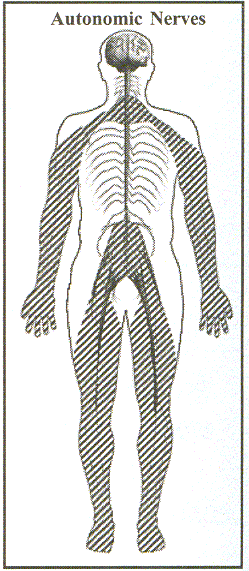
Peripheral nerves go fom your spinal cord to your arms, hands, legs and feet. |
How Can Diabetes Damage to the Autonomic Nervous Affect Me?
Autonomic nerves help you know your blood sugar is low. Some people take diabetes medicines that can accidentally make their blood sugar too low. Damage to the autonomic nerves can make it hard for them to feel the symptoms of hypoglycemia (hy-po-gly-SEE-mee-uh), which is the medical name for low blood sugar.
This kind of damage is more likely to happen if you have had diabetes for a long time. It can also happen if your blood sugar has been too low very often.
|
• Autonomic nerves go to the stomach, intestines, and other parts of the digestive system. Damage to these nerves can make food pass through the digestive system too slowly or too quickly. Nerve problems can cause nausea (feeling sick to your stomach), vomiting, constipation, or diarrhea. Nerve damage to your stomach is called gastroparesis (gas-tro-puh-REE-sis). When nerves to the stomach are damaged, the muscles of the stomach do not work well and food may stay in the stomach too long. Gastroparesis makes it hard to keep blood sugar under control. • Autonomic nerves go to the penis. Damage to these nerves can prevent a man’s penis from getting firm when he wants to have sex. This condition is called impotence (IM-po-tents). Many men who have had diabetes for many years experience impotence. • Autonomic nerves go to the vagina. Damage to these nerves prevents a woman’s vagina from getting wet when she wants to have sex. A woman might also have less feeling around her vagina. • Autonomic nerves go to the heart. Damage to these nerves might make your heart beat faster or at different speeds. • Autonomic nerves go to the bladder. Damage to these nerves can make it hard to know when you should go to the bathroom. The damage can also make it hard to feel when your bladder is empty. Both problems can cause you to hold urine for too long, which can lead to bladder infections. Another problem can be leaking drops of urine accidentally. • Autonomic nerves go to the blood vessels that keep your blood pressure steady. Damage to these nerves makes your blood move too slowly to keep your blood pressure steady when you change position. When you go from lying down to standing up or when you exercise a lot, the sudden changes in blood pressure can make you dizzy. |
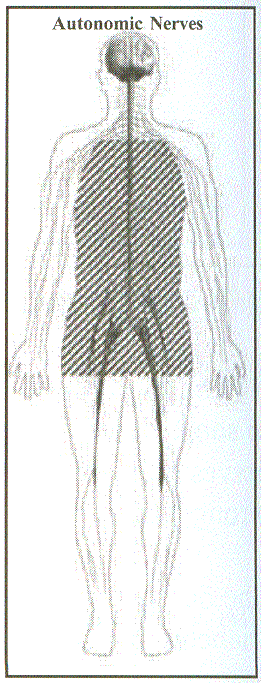 |
| Autonomic nerves go from your spinal cord to your lungs, heart, stomach, intestines, bladder, and sex organs | |
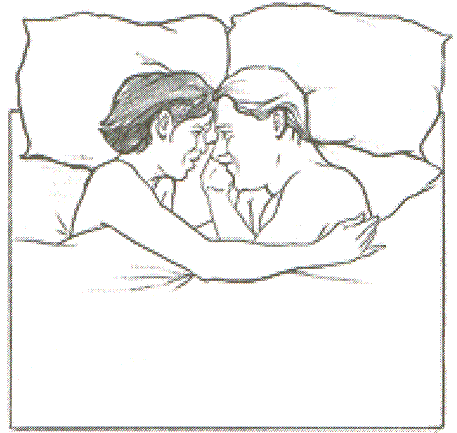 |
|
| Damage to autonomic nerves from diabetes may cause problems with having sex. | |
 |
|
| Damage to autonomic nerves from diabetes can cause bladder and stomach problems. | |
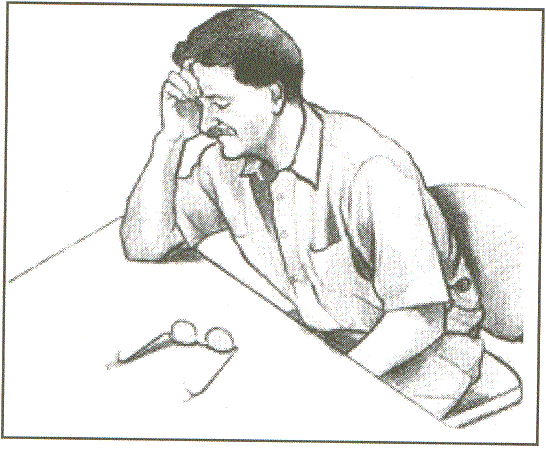 |
|
| Diabetes can damage autonomic nerves that help keep your blood pressure steady. |
How Can Diabetes Damage to the Cranial Nerves Affect Me?
| • Cranial nerves go to the eye muscles. Damage to these nerves usually happens in one eye. The damaged eye does not move together with the healthy one, and you can have double vision. This problem happens all of a sudden and usually lasts for a short time. Your doctor might ask you to wear an eye patch on one eye for a while. | 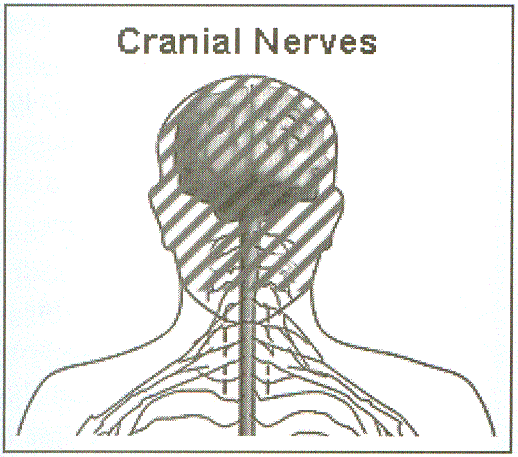 |
| Cranial nerves go from your brain to your eyes, mouth, ears, and other parts of your head. |
• Cranial nerves go to the side of the face. Damage to these nerves usually happens to only one side of the face. This nerve damage causes that side of the face to hang lower or sag. Usually the lower eyelid and lips sag. This problem is called Bell’s palsy. It happens all of a sudden and tends to correct itself.
How Do I Know if I have Nerve Damage?
| If you have one or more of the problems mentioned in this booklet, you may have some nerve damage from diabetes. Tell your doctor about the problem. Ask your doctor what you can do to make the problem better and to stop it from getting worse. | 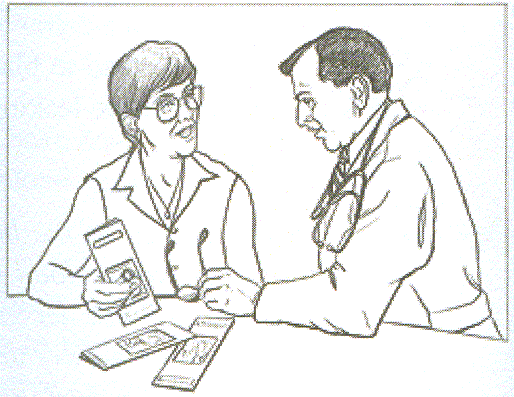 |
| Ask your doctor what you can do about the problems from diabetes nerve damage. |
For More Information
Diabetes Teachers (nurses, dietitians, pharmacists, and other health professionals)
To find a diabetes teacher near you, call the
American Association of Diabetes Educators toll-free at 1-800-TEAMUP4 (1-800-832-6874), or look on the Internet at www.aadenet.org and click on "Find an Educator."
Recognized Diabetes Education Programs (teaching programs approved by the American Diabetes Association)
To find a program near you, call toll-free at 1-800-DIABETES (1-800-342-2383), or see www.diabetes.org/education/edustate2.asp on the Internet.
Dietitians
To find a dietitian near you, call the American Dietetic Association’s National Center for Nutrition and Dietetics toll-free at 1-800-366-1655, or look on the Internet at www.eatright.org and click on "Find a Dietitian."
Government
The National Institute of Neurological Diseases and Stroke (NINDS) is part of the National Institutes of Health. To learn more about nervous system problems, write or call National Institutes of Health Neurological Institute at P.O. Box 5801, Bethesda, MD 20824, (301) 496-5751; or see www.ninds.nih.gov on the Internet.
More in the series
The "Prevent Diabetes Problems" series includes seven booklets that can help you learn more about how to prevent diabetes problems.